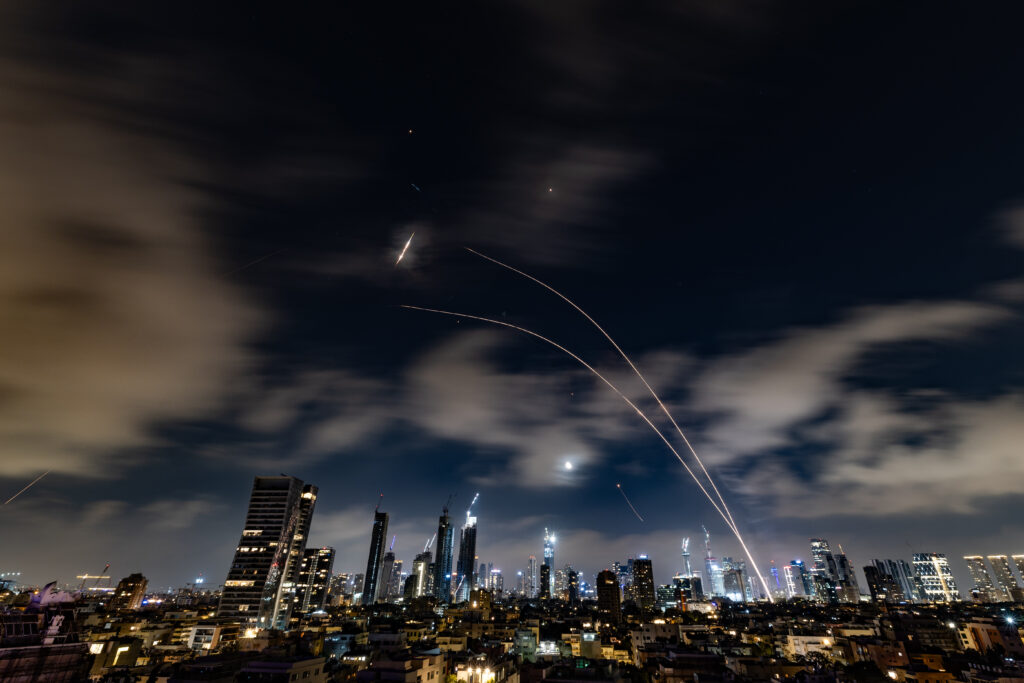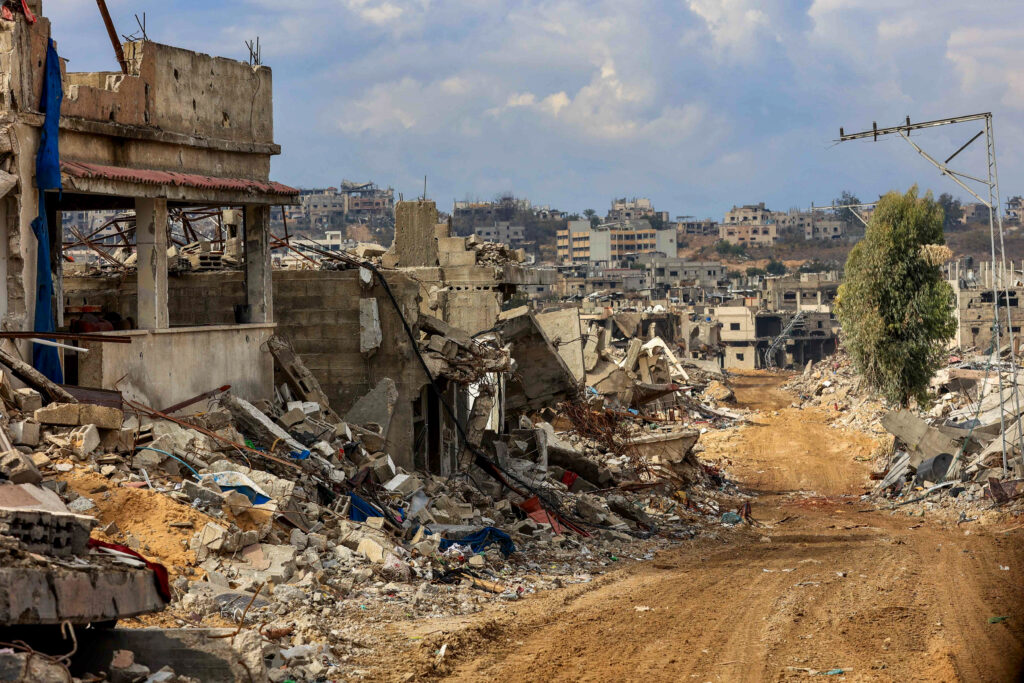For generations, the world viewed Israel as the plucky David fighting Goliath. Somehow, the newly created State of Israel defeated five Arab nations in the 1948 War of Independence. In 1967, Israel crushed Egypt, Syria and Jordan in only six days. Time and again, the outnumbered and outgunned Jewish State not only survived but also thrived. But since 1967, Israel has increasingly been portrayed as the powerful – and of course evil – Goliath. It is now the so-called “Palestinians” who are the heroic Davids being oppressed by great and mighty Israel. This narrative has helped paint Israel in a dark way, despite the fact that Israel is surrounded by enemies and has fought a seven-front war since October 7. Jews everywhere constantly try to explain to the world that Israel is a tiny country the size of New Jersey and not the dangerous empire it is portrayed as by its enemies.
But the reality is that Israel’s unbelievable successes in fighting Iran – a nation more than nine times Israel’s size – means Israel can no longer plausibly claim to be the “plucky David.” Against all rational odds, Israel has become a great power – greater than its worst enemies.
Is this truly Israel’s destiny? Isaiah prophesied that Israel would become the great spiritual center of the world at the end of days. “In the end of days, the mountain of the House of the LORD shall be established at the head of the mountains… and all the nations shall stream to it.” (Isaiah 2:2-4) But a military powerhouse? Is this really Israel’s destiny?
When the prophet Bilaam sought to curse Israel, God instead forced him to bless and prophesy about Israel’s future greatness. In one of the most remarkable prophecies in the Torah, Bilaam is given a vision of Israel’s eventual rise:
“What I see for them is not yet, What I behold will not be soon: A star rises from Jacob, A scepter comes forth from Israel; It smashes the brow of Moab, The foundation of all children of Seth. Edom becomes a possession, Yea, Seir a possession of its enemies; But Israel is triumphant. A victor issues from Jacob to wipe out what is left of the city.” (Numbers 24:17-19)

What era, what generation, is Bilaam referring to in this prophecy? Maimonides explains that Bilaam speaks both of the generation of David (“not yet”) and of the final redemption (“not soon”). His words contain a double vision: the rise of David as a warrior-king and the eventual emergence of a messianic kingdom that would bring God’s justice to earth through strength.
Bilaam’s prophecy that Israel will shake “the foundation of all the children of Seth” means that Israel’s rise will impact the entire human race. Noah, the father of all of humanity, descends from Seth, the third son of Adam. This prophecy, then, is not about Israel’s dominance over one nation or region, but rather about Israel’s impact on the global stage. The rise of Israel will shake the foundations of civilization itself. It is a vision of global transformation.
Today, we are witnessing this unfold. Israel, a nation of only 10 million, has faced and overcome Iran’s regional proxies—Hamas, Hezbollah, the Houthis—as well as Iran itself. Each enemy that rises against Israel falls, and with each fall, Israel’s role becomes clearer: a source of stability, deterrence, and yes, power.
IDF striking in Teheran.
— Magnus Ranstorp (@MagnusRanstorp) June 24, 2025
”One symbolic target was the so-called “Destruction of Israel” clock located in Tehran’s Palestine Square. Erected in 2017 by Iranian authorities, the clock is a provocative installation that counts down to the year 2040, based on a prediction by Iran’s… pic.twitter.com/UKOHT1vP0X
“The city” that will be “wiped out” is, according to the Sages, symbolic of Rome. In Jewish thought, Rome represents the godless and decadent West—the nations like modern England and France who have rejected God and the Bible and have embraced moral confusion and nihilism. These nations of Europe, once steeped in biblical values, have abandoned truth in favor of decadence and appeasement. These same nations now helplessly and fecklessly turn against Israel, not realizing that they are crumbling under the weight of their own moral collapse—triggered by their fear of growing Islamic minorities and the corrosive influence of woke progressivism.
The Bible foresaw this moment: “O happy Israel! Who is like you, A people delivered by the Lord, Your protecting Shield, your Sword triumphant! Your enemies shall come cringing before you, And you shall tread on their backs.” (Deuteronomy 33:29)
Rabbi Obadiah ben Jacob Sforno, a 16th-century Italian rabbi and commentator, explains this to mean: those who once belittled and despised Israel will be forced to reverse their stance and offer honor. Rabbi Naftali Zvi Yehuda Berlin, writes that even Israel’s enemies will come to deny their former opposition, ashamed by how clearly the hand of God will be revealed in Israel’s triumph.
Despite these awesome biblical promises, many Israelis remain reluctant to embrace Israel’s status as a world power. In a recent interview, Michael Yagel Maimon, one of the founders of the Shapira Café Forum, argues that “Israel is already a power—but an apologetic power.” Though Israel has military strength, he says, “we haven’t yet internalized our role. We have the muscles of a regional superpower, but still think of ourselves as the frail Jew of exile.”
Why must Israel embrace its strength? Because strength is now a moral necessity.
First, Maimon argues, Israel must become the protector of the region’s oppressed. The Middle East is full of minorities—Maronites, Druze, Kurds, Shiites—who were forcibly Islamized by Arab empires. “It’s not about conquering,” Maimon says. “It’s about patronage. It’s about standing guard over those who seek our protection. We were oppressed for two thousand years. Now we must become guardians.”
Indeed, this has already begun. Israel protects the Druze of Syria because of its alliance with Israeli Druze. But this must expand into a broader mission. Israel must be the force that prevents genocide, ethnic cleansing, and religious persecution across the region. That is strength in service of justice.
Second, Israel must use its power to dismantle evil at its root. Maimon notes that fear of international backlash led Israel to adopt weak, hesitant policies in Gaza—raids instead of control, momentary deterrence instead of strategic governance. “People ask: Why are we responsible for their schools, their sewage? But those questions miss the point. When you defeat a murderous regime, you take responsibility for preventing the next one.”

He continues: “He who controls the classroom controls the future. No, we don’t need to turn our enemies into Zionists. But we must make sure they are not taught to become murderers.”
Israel’s strength is not about arrogance. It is about ensuring peace by removing the ideological roots of terror. “If we are afraid to wield power,” Maimon warns, “we leave a vacuum. And that vacuum gets filled with chaos.”
The world today associates morality with weakness—and power with cruelty. Israel must prove otherwise. It must demonstrate that moral leadership and military strength are not contradictions.
This is Israel’s mission: to bring redemption by showing that a nation can be both holy and strong, both just and victorious. This is not an accident of history. It is the fulfillment of prophecy.




